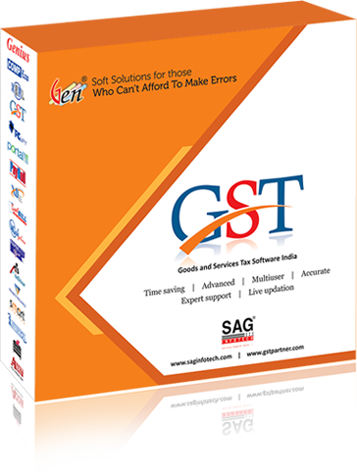The Goods and Services Tax (GST) launched on 1st July 2017 in India has more or less impacted every major and minor business sector in the country. While some industries are seeing growth as a result of decreased taxes, some others are facing a decrease in sales because of increased taxes.
Retail is one of the major industries in India and also one of the largest in the world. The Indian retail industry is expected to reach 1.3 trillion USD bIn y 2020 at a compound annual growth rate of 16.7%. GST is, as usual, applicable to almost every retail supply, affecting the cost for the end consumers. Let’s find out the details about the impact of GST on retailers.
GST Impact on Retail Sector and Retailers in India
GST brings the following benefits to retailers and retail shoppers in the country.
Lower Taxes
GST effectively replaces all the various indirect taxes being applied to the supply of retail products. Before GST, retailers had to pay multiple taxes, including VAT, CST, service tax, excise duty, etc, amounting to around 30% of the product cost. After GST, there is only a single tax, varying from 12 to 28% on different products. GST also reduces the cascading of taxes as the credit for input taxes can be now claimed by retailers.
Input Tax Credit
Unlike the previous tax regime, GST has the provision of input tax credit, in which a retailer can claim credits for the tax previously paid by him on the purchase of inputs. This not only saves tax but also it reduces the cascading effect of taxes.
Reduced Complications
The less number of taxes means less complexity. Also, GST is a completely digital tax system, that means retailers can plan and file the returns online without having to manage a lot of physical documents, accounts, etc.
New Promotional Strategies
The new GST tax regime has forced retailers to replan and implement a completely new promotional strategy in sharp contrast to the erstwhile strategy of promotional gifts and items. This is primarily because under GST all supply channels are accountable and accordingly attract some tax.
Ideal For Startups
The Government has already announced tax rebates for entrepreneurs and startups. With GST getting rid of the complications associated with the retail sector, it is inevitable that budding startups would tap into this opportunity.
Recommended: Benefits of GST on Small Business
Levels The Playing Field
Although startups have the added advantage of being new and hence easily implement new operational as well as supply chain strategies, the existing players in the sector are also surely pleased with the freedom they will now have to draft business strategies as per their strengths and not forced by the yesteryears market norms. Business expansion will no longer be a with one GST number being used for registering all business-related activities across the length and breadth of the country.
GST and Retail Industry: The Road Ahead
GST streamlines previous policies and taxation under one head. GST enables frictionless carry business activities expandable easily across the nation. However, there are a few grievances of the taxpayers which the GST Council, as well as the Central Government, needs to immediately address. Only if the below points are taken into account with an iron hand can GST be the success it was promised to be on the midnight of 1st July 2017.
1. Rationalization With One or Two Planer Slabs.
2. Simplified procedures for filing returns: Too many slabs create Compliance Burden and increase cost on technology and intellectual resource.
3. 100% FDI in Single Brand Retail
- The margin for the local traders has gone down and they are losing out on loyal customers.
- Employment: E-commerce and a good degree of automation will create an unemployable human resource in the sector.
In conclusion, we can say about the impact of GST on retail sector that GST has laid the path for a more organized and transparent retail sector for budding, small and big players alike. The loopholes are the technical glitches of GSTN Network and taxpayers’ non-compliance. The GST Council can surely overcome these issues and ensure proper compliance by taking measures like educating people through social network websites as well as NGOs. For a tax system like GST to work, government and people must be responsible and compliant.
Also Read: MRP Valuation of Goods under GST






